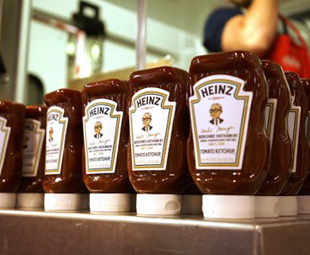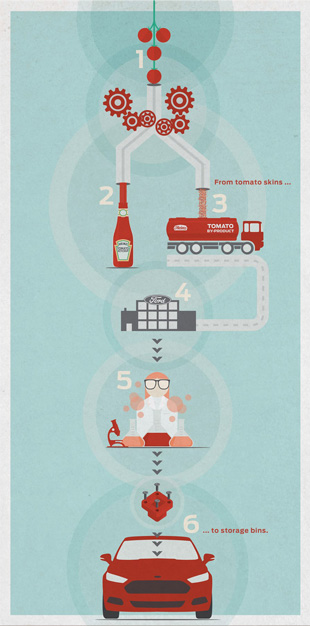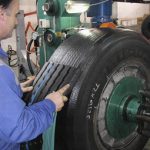You say tomato, Ford says tom-auto

It might seem that tomatoes and cars have nothing in common, but researchers at Ford Motor Company and H.J. Heinz Company – a food processing organisation most renowned for its tomato sauce – see the possibility of an innovative union.
Researchers at Ford and Heinz are investigating the use of tomato fibres, specifically dried tomato skins, in developing sustainable, bioplastic materials for use in vehicle manufacturing. The researchers are testing the material’s durability for potential use in vehicle wiring brackets and storage bins.
 “We are exploring whether this food processing by-product makes sense for use in an automotive application,” says Ellen Lee, plastics research technical specialist for Ford. “Our goal is to develop a strong, lightweight material that meets our vehicle requirements, while at the same time reducing our overall environmental impact.”
“We are exploring whether this food processing by-product makes sense for use in an automotive application,” says Ellen Lee, plastics research technical specialist for Ford. “Our goal is to develop a strong, lightweight material that meets our vehicle requirements, while at the same time reducing our overall environmental impact.”
Nearly two years ago, Ford began collaborating with various companies with the aim of developing a 100-percent plant-based plastic, which can be used to make everything from fabric to packaging. (This will have a lower environmental impact than the petroleum-based packaging materials currently in use.)
At Heinz, researchers were looking for innovative ways to recycle and repurpose peels, stems and seeds from the more than two million tonnes of tomatoes the company uses annually to produce its best-selling product: Heinz Ketchup.
“We are delighted that the technology has been validated,” says Vidhu Nagpal, associate director, packaging research and development for Heinz. “We are in the very early stages of research and many questions remain. We are, however, excited about the possibilities this could produce for Heinz and Ford, as well as for the advancement of sustainable 100-percent plant-based plastics.”
Published by
Focus on Transport
focusmagsa




